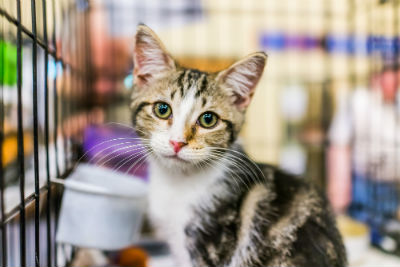
Waynesboro City Manager Mike Hamp seemed to suggest that residents could just quietly ignore the restrictions on the number of pets they can own that he proposed as part of an update to the animal control ordinance that he presented to City Council this week.
Which might be easier said than done, considering how the proposed ordinance mandates jail time for violations.
“It may be helpful and comforting in some regard to hear a word about compliance currently, and I would anticipate going into the future. The city acts on provisions of the animal ordinance by complaint. We do not intend or have a plan to go door to door seeking out violations of the ordinance, if adopted, and we would simply respond by complaint regarding a particular residence,” Hamp said in his presentation to City Council on Monday.
“Having said that, and without suggesting or encouraging animal owners to evade the law, it is conceivable then that if you had an animal that was in violation of the law, but did not draw unnecessary attention to itself or the residence, that it could go on without encountering regulatory action by the local government,” said Hamp, whose proposal would limit the number of dogs per household at four, the number of cats at five, the number of chickens at 10, and would prohibit residents from owning roosters.
The limits themselves are controversial, and then there are the parts of the ordinance on the table that mandate no grandfathering and criminal sanctioning – basically, if you’re above the proposed limits today, ahead of the new law going into effect, you’d be outside the law in 90 days, with the penalty for a first offense a Class 4 misdemeanor, a second offense constituting a Class 3 misdemeanor, and third and subsequent offenses a Class 2 misdemeanor, which carries with it possible exposure to jail time.
Wildlife Center of Virginia President Ed Clark noted possible legal exposure for the city to City Council members at the meeting.
“I think that you’re on thin ice in some ways, when you start to impose arbitrary numbers, and especially with the failure to grandfather. I think you have potentially legal vulnerability from ex post facto regulation that something that was done legally, then subsequently is declared illegal, and the person is held accountable. There’s certainly a legal standard that needs to be considered there,” Clark said.
So, the city may be on thin ice legally if the City Council were to pass the ordinance as it was presented.
And then, there’s the extra costs that would be associated. Renee Clark, the vice president of Cats Cradle, a Harrisonburg-based nonprofit, spelled out for City Council how the limit on cats, which would be enforced by requiring the licensing of cats, would end up being costly to taxpayers.
“You have to pay Animal Control more to go out and round these cats up. Then you have to bring them to the shelter of Shenandoah Valley Animal Services Center, which is already stretched so thin with staff and funding, so you’re going to have to up your monetary contributions to the shelter, which I wouldn’t think anyone would want to do that, because for community cats it typically results in killing cats,” Clark said.
“If you bring a feral cat into most shelters, the greatest danger to the animal is to be killed. You know, you have to hold it for five days, the taxpayers of Waynesboro have to pay to feed that animal, they have to pay to euthanize that animal. Maybe you can find a barn for it to go to, but then you’re going to have a lot of barn people who are going to be reluctant to come forward to you because it penalizes them,” Clark said.
So, legal exposure for the city, which could be costly in terms of defending lawsuits that the city would be likely to lose.
Then, the extra costs in terms of the increased burden on the animal control office and the local animal shelter.
And then, we get the moral costs of taking animals from loving homes to have them put to sleep.

City resident Casey Eldridge, who fosters animals and volunteers with local dog and cat groups, noted the impact that the regulations would have in that respect.
“On the off chance that animal control finds themselves receiving complaints, the neighbor has five dogs or 12 chickens or eight cats, and there are no other laws being violated, it’s likely that these excess animals will be brought to the shelter,” Eldridge said. “Our shelter, which already operates at the brink of capacity, constantly, for the fiscal year of 2020, Shenandoah Valley Animal Services Center, euthanized 4.7 percent of its animals that are brought in or that were brought into it. We’re an open intake shelter, we have to take what’s brought to us, whether that’s 40 cats left on the porch or a chicken or a pig on the loose. We take it all. But we only euthanized 4.7 percent of the animals that were brought in through intake.
“The national average is 56 percent of dogs and 71 percent of cats that go into shelters are euthanized,” Eldridge said. “And while I am convinced that our shelter is staffed with miracle workers and superheroes, the proposed amendments would put additional strain on resources by virtue of increasing surrendered and removed animals that are going into the shelter and combining that with a smaller pool of potential adopters and fosters.
“To be clear, we would have a rise in our euthanasia numbers, and animals who would otherwise be loved and well cared for will die,” Eldridge said.
Think that one through as you try to get some sleep tonight.
Hamp’s suggestion that pet owners can just ignore the limits that he proposed and hope for the best is of little solace to residents who would have to take his word for it, with fines and jail time hanging over their heads if the Waynesboro Police Department decides to follow the letter of the law to the fullest extent.
City Councilman Bruce Allen made it clear after the presentation from the city manager that he is not on board with the proposed limits, though significantly he was the only member of City Council to go on the record in that respect.
“When we get to the numbers, and what we’re looking at here tonight, and more information that we’ll be getting, I’m telling you right now, I have a really, really hard time for anyone that’s an animal lover or has animals in their home, if they had more than this limit that we would pass, and then we tell you, well, you’re going to have to cut out some of your stock here. I only have one animal, one cat, and my wife would throw me out before she would throw the cat out. If we had six cats or 10 cats and this law was passed, I don’t know what would happen in the Allen household, but my wife would probably say we were moving. We really need to take a long, hard look at this,” Allen said.
Hamp, responding to Allen, said he would encourage the City Council to consider his proposal as a “starting point.”
“As the city manager, I’m responsible for the work, and to the extent that folks are satisfied with it or think that this is a good point at which to start, I’m glad that you’re pleased. To the extent that you feel like this is a poor position from which to start, then I bear responsibility for the recommendation,” Hamp said. “But again, I think that whether we’ve highlighted the areas in which the council has discretion to work, I think it’s incumbent upon the council to try to discern what our community preferences are, in this regard, and it’s incumbent upon me to alert you to the fact that again, we may end up in exactly the same place that we are today. And if that’s the case, at least, we will have done so by design and with some intentionality.
“I don’t think it’s a comfortable place for the manager, the staff and to some extent, the council and even the community to be where we have not examined and discussed and articulated what the community standards are, what the rules are around some of these, that some of these animals and whether we want to take a more contemporary approach or whether we’re comfortable with the rules as they were established mainly in 1964, 1996 and 2007.”
Mayor Bobby Henderson called the proposal from Hamp “a good place to start, a good place to start the conversation, so we can work on it for the next three or four weeks and iron out what needs to be ironed out and come back.”
The “next three to four weeks” time frame is the arbitrary time frame that City Council members set Monday night ahead of a planned Sept. 27 vote on the ordinance.
Which is to say, there’s nothing pressing – no state- or federal-imposed deadline that we have to meet. Sept. 27 is a date that City Council pulled out of the air.
And since the City Council didn’t vote to set a public hearing for discussion of whatever second or subsequent drafts to the proposed ordinance there might be, it is entirely possible that the ordinance could be voted on with the only input from the public being emails and phone calls that may or may not be taken into consideration by city leaders.
Leaving residents whose lives could be turned upside down in a month’s time to trust that City Council will do the right thing, when it sure didn’t sound like that’s what’s going to happen.
It’s going to be a tough month, as a result, for a lot of folks like Leah Cave, who told City Council that she had “spent my weekend looking at real estate.”
“I am fully prepared to sell my house and leave Waynesboro to protect my animals. I moved here five years ago because I love Waynesboro, I love the small-town feel, I love the people, and I love how welcoming it is. I no longer feel like my family is welcome here,” said Cave, whose family includes her husband and four children, and two dogs, three cats, eight hens, two roosters and two house pigs.
“I never realized that they were not allowed,” Cave said. “The current ordinance states nothing except regulations on how you can pen your animals outside. My animals are not outside. I have pictures that I can show you. They are inside. They are my son’s best friends. They sleep with him at night. I am a stay-at-home mom. My animals are never left alone.
“They are my pets. They come inside with me. My hen gets a bubble bath, and has me blow dry her feathers, and she raises up her wings,” Cave said. “They are not a nuisance. My neighbors love them, my pigs and my chickens. Fresh eggs certainly help.
“I’m asking that if you do pass these new ordinances, to please grandfather in the pets that we currently have. Allow us to keep our family members,” Cave said.
Story by Chris Graham










